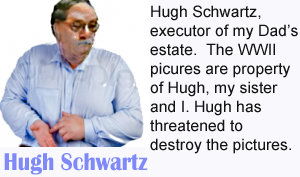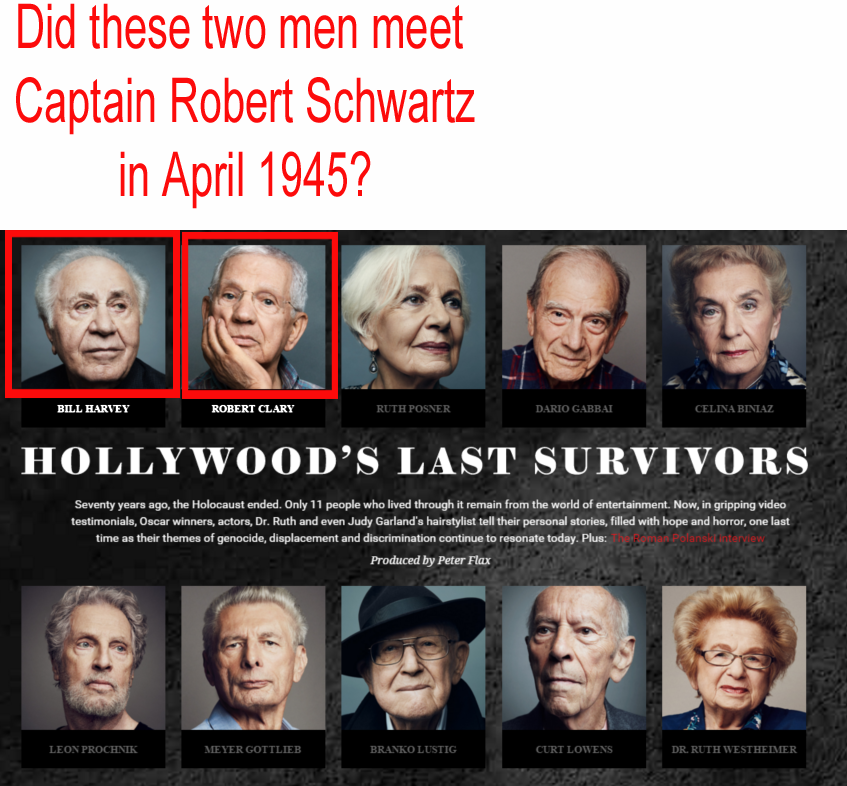

Ten survivors from the camps remain with Hollywood careers. Two of these were children when my father entered Buchenwald. While my brother and sister are in court trying to see that the images will “rot,” I want badly to send them the pictures Robert took so perhaps they can write a few words about the liberation. The stories of these last ten survivors can be found by clicking the image or their links.
The Hollywood Reporter Tells the Story of “Hollywood’s Last Survviors”
- Bill Harvey
- Robert Clary
- Ruth Posner
- Dario Gabbai
- Celina Biniaz
- Leon Prochnik
- Meyer Gottlieb
- Branko Lustig
- Curt Lowens
- Dr. Ruth Westheimer
Bill Harvey was as close to death as a human being can be.
He already had survived a stint at Auschwitz, months of forced labor, barefoot death marches, and then, early in 1945, he and other prisoners were crammed into a frigid cattle car for transport from Poland to the Buchenwald concentration camp in Germany. He lost consciousness and woke up five days later in the barracks, barely able to move. There, he was told that someone had pulled his body out of a pile of corpses stacked by Buchenwald’s crematorium. “I was frozen; they thought I was dead,” he recalls. “I was the age of 21. I weighed 72 pounds.”
In His Own Words
“I was the age of 21. I weighed 72 pounds.”
Now 91, he harbors no hatred for the Germans. “My humble explanation for all the tragedies and the bad people who want just to kill is that maybe there have to be some bad things in order to appreciate all the good things that this world gives you,” says Harvey, who went on to be a cosmetologist to the stars, working in New York before coming to Los Angeles in 1950. He owned two salons, including the Continental House of Beauty in Beverly Hills, doing hair for Judy Garland, Mary Martin, Zsa Zsa Gabor and a young Liza Minnelli.
One of six children, Harvey grew up in a winegrowing region in Czechoslovakia. Life was not easy — his father was always ill, his mother supported the family as a dressmaker and Harvey started working at a vineyard when he was 10. Two years later, Harvey heard Hitler on the radio: “He said, ‘I’m going to kill every Jew in this world.’ ”
Bill Harvey as a child.
Those words seemed very real on a day seven years later, when the Germans knocked on their door and gave the family five minutes to gather a few possessions and leave. The next stop was a ghetto, and six weeks later, they were crammed into a cattle car bound for Poland. “I cannot tell you what a terrible journey it was,” recalls Harvey, weeping as he remembers his arrival at Auschwitz. “It looked like a Twilight Zone. Big chimneys going to the sky. Smoke was going all over. We didn’t know where the smoke was coming from — that they were burning human beings.” On that awful day, Harvey lost his mother, his aunt and many cousins. And the next 18 months were filled with suffering.
Though recalling his Holocaust experience is wrenching, Harvey feels he has “no choice” but to share it. “This story can not die,” he says. “I have to be strong enough to tell it.” — Peter Flax
SEE PHOTOS of Bill Harvey by Wesley Mann
Robert Clary, 89, can discuss the Holocaust without exposing obvious emotion, but that serenity dissolves as he recounts his 1942 arrival at Auschwitz.
He was 16. The cattle car doors swung open, and SS guards were screaming at inmates to get out and sit on the ground. “My mother said the most remarkable thing,” recalls Clary. “She said, ‘Behave.’ She probably knew me as a brat. She said, ‘Behave. Do what they tell you to do.’ ” Clary needs a moment to regain his composure after recounting this final conversation with his mother, who was killed that day with his father in the gas chamber. Of 14 family members who were deported to the camp, he was the only one who survived to see liberation.

Clary was born into a strict Orthodox family in Paris, but the childhood he recalls was full of joy. From a young age, he was a determined entertainer. He’d go on to find success after the war — as a singer and an actor on Broadway, TV and film (he’s best known for his role as the French patriot Cpl. LeBeau on Hogan’s Heroes, which is set in a German POW camp).
Clary’s passion to entertain helped sustain him during his darkest moments. At Buchenwald, he sang with an accordionist every other Sunday to an audience of SS soldiers. Clary feels certain that his singing gave him a purpose and an escape and thus helped save his life: “Singing, entertaining and being in kind of good health at my age, that’s why I survived,” he says. “I was very immature and young and not really fully realizing what situation I was involved with. … I don’t know if I would have survived if I really knew that.”
Survival wasn’t easy. He was forced into labor at a prison shoe factory in Germany that the Allies bombed regularly. And with the war’s end looming, the Nazis ordered Clary and other prisoners on an arduous death march from Poland to Germany. Clary says that only 1,500 of the 4,000 prisoners who started were alive at its completion. “All the others died on the road.”
For decades, as he settled into a new life in America and his career took off, Clary chose not to discuss what he had been through. But in the 1980s, after he saw a documentary about a woman who had survived Auschwitz, he signed on with the Wiesenthal Center and began sharing his story. Says Clary, “I stopped having nightmares the moment I opened my mouth.” — P.F.

Clary (center) clowned around on the set of ‘Hogan’s Heroes’ in 1969.
